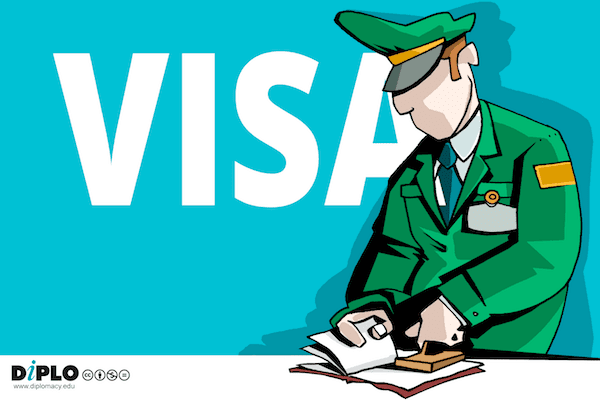Consular and diaspora diplomacy
Consular diplomacy (affairs) is related to the protection of the state’s interests as well as the interests of its citizens and legal entities in the host country. It includes strengthening and developing relations between diaspora and the home country in the fields of economy, investments, culture, and education. An important segment of consular affairs is activities on issuing travel visas to the citizens of the host country and travel documents to its own citizens.
Migration produces diasporas. According to International Organization for Migration, it is estimated there are more than 280 million international migrants in the world. Today diasporas are active in international affairs. The interconnected areas of providing citizens with consular services, and working with the diaspora, are now priorities in international affairs.
What are the tasks of consular work?
First, it covers the distinctly ‘consular’ tasks, i.e. protection of the nationals and corporate bodies of one’s own country, and travel facilitation for the nationals of the receiving state and third country nationals, through the issue of visas. The Visa issue is a sovereign right. The state is not answerable to any foreign country on the persons it may exclude from travel to its home territory. Consular work also includes providing protection and assistance to home nationals facing distress in foreign countries. Such as the loss of passports, arrest in a foreign country, notary and other legal document services, emergency repatriation, dealing with death overseas. New tasks: looking after skilled and semi-skilled workers working on contract in foreign countries, providing a kind of loco parentis service to one’s students abroad. Sometimes labor attachés and education attachés handle this. In a small embassy or consulate, this is part of normal consular work.
Second, some work of consulates replicates that of embassies, including the development and pursuit of commercial, economic, media, cultural, and scientific relations and reporting on these developments to the home country. In this sense they resemble embassies. They also maintain ‘political’ contact with the local administration, i.e. with the provincial, or city administration. They do not normally deal with the foreign central government. If diplomatic relations are not established, and yet consulates exist, they perform quasi-diplomatic functions, keeping the two countries in contact. It may also happen that when countries break off diplomatic relations in a crisis, they retain consular ties.
How is consular diplomacy performed?
Consular diplomacy is the ‘citizen service’ aspect of diplomacy. It deals mostly with ordinary people. We should view consular work from a public service management perspective. Normatively, it entails:
- Customer orientation: citizens, one’s own and those from foreign states, are treated as the customers.
- An attitude of respect and friendliness towards all those seeking consular services.
- A problem-solving attitude; often those seeking consular services face some form of difficulty.
- Efficient handling of services adds to the positive image of the country.
- Media management is a new dimension of consular work, given that individual cases, be it of imprisonment abroad or family disputes, especially involving children, get public attention. All this is multiplied into instant news via social media.
How is consular diplomacy conducted?
Consular work is treated as a branch of diplomatic work. As with other diplomacy activities, we have to distinguish between the two locations from where the consular activities are undertaken: from the home country, and by embassies and consulates abroad.
At home, the first task is the formulation of policy relating to the foreigners who visit and work in the country, and the visas and work permits that they must seek, including the treatment to be given to foreign students. This is handled by home agencies, with inputs from the foreign ministry, and others such as tourism, investment promotion, and other agencies that want to attract foreign nationals. Related tasks:
- The issue of passports: in most countries a special agency, or a branch of the interior ministry handles this; in some countries the foreign ministry is responsible.
- Consular network oversight: the foreign ministry handles this, via its consular affairs department.
- Issuing travel advisories: with the spread of mass travel, and the volatility of international crisis, this has become a major ministry of foreign affairs (MFA) activity, monitoring the security situation in foreign countries and posting advisories, on websites.
- Some countries now ask citizens traveling abroad to register online with the MFA, as a precaution.
- Diaspora policy: this has emerged as important. Western foreign ministries are now developing their own diaspora policies.
Embassies and consulates are the delivery agents for consular services. Their work includes:
- Policy advice: from the field, they provide reports on issues, and offer suggestions on the national policy.
- Local information: they furnish information on local conditions, which forms the basis of travel advisories issued from home.
- Contact with citizens and the diaspora: this includes non-citizens with ties of kinship and blood. For an embassy this is a major task, personally engaging the ambassador.
- Registration of citizens: rather few actually do so. Owing to natural and man-made crises of recent years, this has become important.
- Emergency assistance: this is delivered to individuals, groups, and to entire overseas communities, depending on the nature of the problems. In emergency situations, this requires imaginative and quick responses, as we see below.
Embassies also undertake consular work, as a part of their normal functions. A medium or large embassy would have a separate ‘consular section’, headed by a diplomat. In very small embassies, which issue few visas and may not have a large diaspora population, this is handled by an official on a part-time basis.
Why does diaspora matter?
Diasporas are especially important as allies in advancing external relations. Outreach to a diaspora moves through the stages of : 1. exploitation (to draw in remittances and investments); 2. accommodation (via special facilities such as visa exemptions, property rights, and dual citizenship), and 3. networking (using the diaspora as a connector for better political relations).






